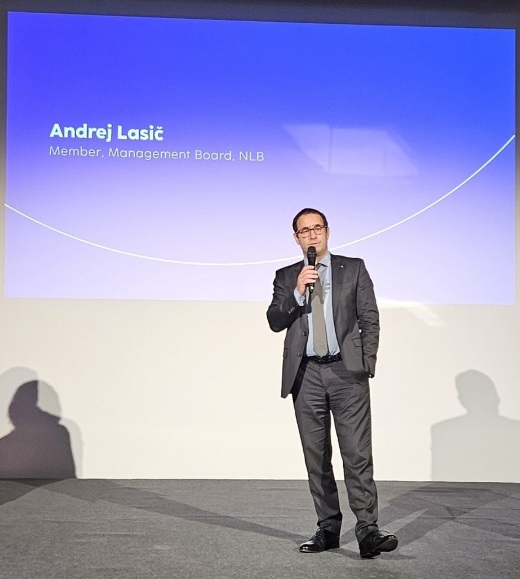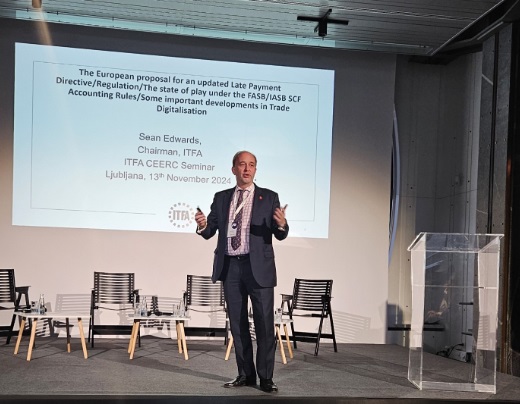-
 ITFA represents the rights and interests of banks, financial institutions and service providers involved in trade risk and asset origination and distribution.Our Mission
ITFA represents the rights and interests of banks, financial institutions and service providers involved in trade risk and asset origination and distribution.Our Mission
Contributed by Kristijan Hvala, for the Bank Association of Slovenia, Ljubljana, November 14, 2024
On November 13, 2024, Nova Ljubljanska Banka (NLB) hosted the annual meeting of ITFA’s (International Trade and Forfaiting Association) regional committee for Central and Eastern Europe at the Centre for Innovative Entrepreneurship. ITFA is a global trade association for companies, financial institutions, and intermediaries involved in global trade and receivables financing.
The event saw record attendance, with over 100 banking professionals from 40 financial institutions in the Central and Eastern European region. This turnout highlights banks’ awareness of the importance of supporting their business partners in international trade, especially in uncertain economic conditions, slowing growth, and increased geopolitical risks. Discussions also tackled challenges posed by evolving regulations and digitalization trends in supply chain finance.
The event was officially opened by Semih Özcan, Head of Corporate Business at VakifBank International and Chairman of ITFA’s regional committee. He emphasized the need for innovative solutions to support international trade, particularly for small and medium-sized enterprises. Özcan also outlined ITFA’s mission, organizational structure, and its over 50 annual conferences worldwide.
On behalf of the host, Andrej Lasič, NLB Management Board member, noted the strategic potential of countries represented by the banking delegates, whose total assets exceed €8 trillion. He highlighted that the dynamic geopolitical and economic landscape offers opportunities, especially for banks, to play a critical role in facilitating international trade with EU-accession countries.

Helena Belingar, Director of Trade Banking at NLB, ITFA regional committee member for Central and Eastern Europe, and Chairperson of the Documentary Banking Operations Committee at ZBS, welcomed guests with an insightful introduction about Slovenian culture, tradition, and creativity. She emphasized that the exceptional turnout is not just a recognition of NLB but of Slovenian banking as a whole. The strong response also underscores the interconnectedness of the European economy, as banks increasingly recognize the importance of supporting their business partners in international trade.
In the central part of the event, participants delved into macroeconomic developments and regulatory changes shaping trade finance locally and globally.
Dorota Strauch from Raiffeisen Bank International presented economic outlooks for the Central and Eastern European region in the context of the “new normal,” considering factors like the recent U.S. presidential election results and the cooling of the German economy. She highlighted the resilience of CEE economies and projected a “consumption-driven muted recovery” for 2025. Strauch also analyzed potential negative effects of U.S. economic policies on Europe and China, such as tariffs, looser fiscal policies, and inflationary pressures.
Charlie O’Mulloy from the European Bank for Reconstruction and Development (EBRD) and Maria Mogilnaya from CargoX showcased a case study on the import of Mongolian cashmere to the EU. They explored how advanced technologies are reshaping international trade, goods transport, and trade instruments, focusing on circularity, sustainability, and ethics. Recent EU regulations, including the CSRD and CSDDD directives, the EU CBAM mechanism, and the digital product passport (DPP), were highlighted as critical drivers of these trends.
Panel Discussion A panel discussion moderated by Siân Aspinall, CEO at BPL Global and ITFA Insurance Committee Chair, addressed approaches to protecting receivables against commercial and political risks. Panelists agreed that such insurance is an invaluable tool for increasing exposure volumes and improving capital management while offering clients more accessible and affordable financing.

Sean Edwards closed the presentations with an update on the legal and regulatory developments in supply chain finance. He discussed the European Commission’s proposed regulation to combat late payments, which would impose a 30-day limit for all B2B transactions. Edwards warned of the potential drastic negative consequences of such measures, supported by empirical studies from Germany. ITFA has actively presented counterarguments to policymakers in Brussels. Similarly, joint initiatives were launched in March 2024 by the Chamber of Commerce and Industry of Slovenia, the Bank Association of Slovenia, and ICC Slovenia.
Networking and Closing
The event provided attendees with opportunities to exchange knowledge, address key market and regulatory trends, and discuss potential business opportunities. It concluded with a guided tour of Bankarium, Slovenia’s banking museum, located in the former City Savings Bank of Ljubljana on Čopova Street. The museum showcases Slovenia’s banking heritage from 1820 to the present. Attendees learned intriguing facts, such as the issuance of the first coin and banknote, the origin of terms like “money” and “bank,” the weight of an ATM, and the record number of credit institutions in pre-World War II Slovenia.
Privacy Policy | Cookie Policy
Designed and produced by dna.studio